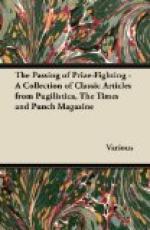* * * * *
“An ex-Army officer
was charged with stealing cooks valued at
51/- from Messrs. ——’s.”—Sunday
Paper.
At that price they must have been very plain cooks.
* * * * *
[Illustration: THE SHRINE OF HONOUR.
“WHO GOES THERE?”
“I HAVE NO NAME. I DIED FOR MY COUNTRY.”
“PASS, UNKNOWN WARRIOR.”]
* * * * *
=ESSENCE OF PARLIAMENT.=
Monday, November 1st.—In response to a renewed demand for the Admiralty’s account of the Battle of Jutland the PRIME MINISTER made the remarkable statement that it was very difficult to get “an official and impartial account,” but he added that the Government were willing to publish all the reports and despatches on the subject and leave the public to judge.
Who shall decide, when Admirals disagree?
Why, JULIAN CORBETT, or the great B.P.
Owing to the unexpectedly rapid passage through Committee of the Government of Ireland Bill last Friday, the way was cleared for a number of British measures. Although dealing with the most diverse subjects they were alike in one respect—without exception they incurred the hostility of Sir F. BANBURY. Whether it was a proposal to reduce the dangers of employing women in lead processes or to give married women in Scotland the same privileges as their English sisters (including the duty of supporting an indigent husband), or to hold an Empire Exhibition, or to set up Juvenile Courts, the hon. baronet found reason for opposing them all.
Once or twice he secured the support of Sir JOHN REES, but for the most part he was Athanasius contra mundum, maintaining his equanimity even when Mr. HOGGE advised him to “marry a Scotswoman;” or Lady ASTOR expressed her regret that he had not women, instead of bankers, for his constituents.
[Illustration: “ATHANASIUS CONTRA MUNDUM.”
SIR FREDERICK BANBURY.]
The Government had no reason to complain of his activity, which may indeed have prevented the intrusion of more dangerous critics; for despite his efforts every Bill went through.
Tuesday, November 2nd.—The most striking thing in Lord LOREBURN’S speech upon Irish affairs seemed to me to be his uncompromising declaration that he was “no supporter of Mr. ASQUITH.” He endorsed, however, his former chief’s demand for an independent inquiry into the reprisals, but his motion was defeated by 44 to 13.
[Illustration: “No supporter of Mr. ASQUITH.”
LORD LOREBURN.]
Ever since Sir W. JOYNSON-HICKS defeated Mr. CHURCHILL at Manchester he has felt it his duty to keep on his track. Convinced that our policy in Mesopotamia is due to the WAR MINISTER’S megalomania he is most anxious to bring him to book. The prospect of a Supplementary Estimate for the Army seemed likely to furnish the desired occasion. But when he pressed Mr. CHURCHILL on the subject the alleged spendthrift airily replied that there was no hurry; “I do not immediately require money.”




